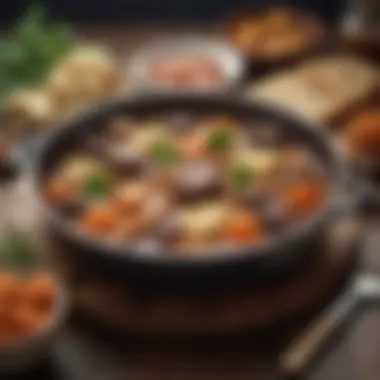Irish Blessings: Celebrating Gratitude at the Table


Intro
In the heart of Irish culture lies a rich tapestry of traditions that emphasize the importance of community and appreciation. One such tradition is the use of blessings during meals. These blessings serve as reminders of gratitude, connection, and the joy of sharing food with others. In this culinary guide, we will delve into the significance of Irish blessings, exploring their historical backdrop and their essential role in fostering community bonds.
Irish blessings have been passed down through generations, deepening their roots in a culture that values togetherness. They are often recited before meals, transforming the act of eating into a moment of reflection and appreciation. This simple gesture acknowledges gratitude for the food, the company, and the shared experience.
As we navigate through various traditional blessings, their origins, and their contemporary relevance, readers will discover how these expressions of gratitude not only enhance dining experiences but also elevate the meals themselves into meaningful encounters. The following sections will provide insight into how these rituals can be incorporated into modern gatherings, creating a bridge between the past and the present.
Preamble to Irish Blessings
The topic of Irish blessings plays an essential role in this article, as it delves into the intricate relationship between culinary practices and expressions of gratitude. Irish blessings are not mere phrases; they encapsulate the spirit of generosity and unity found in shared meals. By examining these blessings, readers gain insight into how they enhance dining experiences, making them more meaningful.
Understanding the Essence of Blessings
Irish blessings are deeply rooted in the emotional fabric of Irish culture. They reflect values such as hospitality, warmth, and respect for tradition. When shared before a meal, these blessings serve as a reminder of the bonds between those at the table. This practice fosters gratitude and appreciation, setting a positive tone for the meal.
These blessings can take various forms. They might be short and simple, or they may be more elaborate, depending on the occasion. Regardless of the length, the essence lies in their intent: to cultivate a sense of community and reverence for food and those who share it. The very act of reciting a blessing can enhance the meal’s enjoyment, prompting diners to reflect on their good fortune.
Cultural Significance of Irish Traditions
Understanding the cultural significance of Irish traditions is crucial for appreciating the role of blessings in meals. In Ireland, food is often a conduit for social interactions. Meals are gatherings that connect family and friends, reinforcing relationships.
Irish blessings contribute to this by creating an atmosphere of goodwill. They reflect the island’s history, characterized by hardship but also resilience. For instance, many Irish blessings acknowledge the comforting presence of loved ones and the importance of sharing moments together. This is particularly relevant during special occasions, where blessings signify deeper meanings of community and belonging.
The historical context of these blessings interweaves with culinary practices. Traditional dishes served at gatherings often accompany specific blessings, highlighting the link between food and cultural identity. By embracing these traditions, individuals can partake in an age-old practice that enriches their dining experience.
Historical Background of Irish Blessings
Understanding the historical background of Irish blessings offers insight into their significance within the framework of shared meals. These blessings are not merely rote recitations before dining; they embody generations of cultural expressions, community values, and social cohesion. Embedded in the DNA of Irish culture, they echo the communal aspects of meals, emphasizing gratitude and togetherness.
Roots in Ancient Ireland
The origins of Irish blessings trace back to ancient times when oral traditions were the primary means of conveying wisdom and cultural values. In pre-Christian Ireland, blessings were often associated with nature and the cycles of life. The Druids, who played a central role in early Irish society, incorporated blessings into their rituals and communal gatherings. They understood the impact of words and their power to shape experiences.
During this time, blessings might include references to natural elements, invoking deities or ancestral spirits. The act of sharing a meal was seen as a sacred moment, enhanced by words of thanks or encouragement to foster harmony among participants. This concept is intrinsic to Irish culture, where the gathering of family and friends around a table is celebrated as a significant social event, weaving interpersonal ties.
Evolution Through the Centuries
As Ireland entered various historical phases, including invasions and colonization, the blessings evolved alongside the changing societal contexts. In the medieval period, Christian influences permeated the landscape, integrating religious sentiments into traditional blessings. The simplicity of ancient expressions transformed into more formalized invocations, often linked to Christian narratives.
Moreover, the development of the Irish language played a crucial role in shaping these blessings. Unique phrasing and poetic structures emerged, enriching the oral traditions associated with meal times. With the 19th-century Gaelic revival, there was a renewed interest in preserving these blessings as vital aspects of cultural identity. Efforts to document and promote them ensured their continuity despite the pressures of modernization.
Irish blessings have become more than a mere formality prior to dining; they serve as conduits of connection across generations. Today, the modern Irish continue to celebrate their heritage by incorporating these centuries-old blessings into family meals, thus sustaining the tradition and deepening their roots within the communal experience.
The Role of Blessings in Meals
The integration of blessings into meals serves more than a ceremonial purpose. It occupies a significant role in enriching interpersonal connections and establishing a unique atmosphere during mealtime. Recognizing the importance of blessings enhances our appreciation for shared food experiences. They create meaningful pauses, allowing individuals to reflect on gratitude before engaging in the act of eating.
Setting the Tone for Shared Experiences
Setting the tone during a gathering is crucial for fostering connection among participants. Irish blessings inherently serve this purpose, initiating a mood of warmth and reflection. When a blessing is recited, it invites everyone at the table to engage in a shared moment of gratitude. This act often cultivates a sense of belonging, encouraging open communication and deeper conversations.
By choosing an appropriate blessing, hosts can tailor the atmosphere to suit the occasion. For instance, a blessing might be more solemn during a family gathering to honor a loved one, while a light-hearted blessing can be utilized in festive situations. This intentionality not only influences the emotional undertone but also reinforces relationships, as guests feel more connected to each other within that shared context.


Fostering Community Through Meal Traditions
Meal traditions have the power to build community and facilitate bonding. Irish blessings emphasize this unity, particularly as they are often recited in a communal setting. The act of togetherness becomes a central theme, as blessings remind diners of their shared humanity and common experiences.
Incorporating blessings into meals can serve as a means to share stories and legacies. Many blessings are steeped in historical significance, offering a glimpse into deeper cultural narratives. They articulate values such as hospitality, love, and kindness—all vital components of a thriving community. Each blessing tells a story of its own, connecting individuals to their heritage and each other.
Ultimately, the inclusion of blessings enhances the dining experience. It invites individuals to engage not only with the food but also with one another on a profound level. As these traditions are honored and passed down, they cultivate an enduring appreciation for shared meals and the bonds they create.
Common Irish Blessings for Meals
The tradition of incorporating blessings into meals holds a significant place in Irish culture. These blessings are not merely words spoken before dining; they serve as an expression of gratitude, reinforcing community ties and creating a moment of reflection. The blessings can also enhance the dining experience by fostering a deeper connection between those present, elevating the act of sharing food into something more sacred. Here, we explore the historical and contemporary significance of common Irish blessings used during meals.
Traditional Blessings Recited at the Table
Traditional Irish blessings are often simple yet profound. They express a deep appreciation for food, family, and friends. One widely known blessing is:
"May the food before us be blessed, and may we be grateful for its nourishment."
This encapsulates not just gratitude but also respect for the source of sustenance. Such blessings are typically recited aloud by the host or the eldest member of the gathering, creating a communal moment of acknowledgment.
Another common blessing is:
"May your blessings outnumber the shamrocks that grow and may trouble avoid you wherever you go."
This particular blessing intertwines luck with meal sharing, reflecting the cultural importance of well-wishes in Irish society. The repeated practice of these blessings reinforces cultural identity and continuity across generations.
Direct engagement with these traditional blessings adds a rich layer of meaning to meals. They remind those at the table of the values held in shared experiences, connection, and heritage. A meal is transformed from mere sustenance into a gathering of hearts and minds around the shared spirit of gratitude.
Modern Adaptations and Usage
In the contemporary context, Irish blessings for meals have evolved, reflecting modern sensibilities. While traditional phrases may still be used, many families and social groups have adapted blessings to fit their specific gatherings. This shift often includes personalized blessings that resonate more closely with individual values or current events. For instance, a family gathering might include:
"May we gather here today with thankful hearts, cherishing every moment together."
This modern adaptation underscores the importance of family and togetherness, incorporating a more personal touch that reflects the specific context of the gathering.
Furthermore, social media platforms like Facebook and Reddit have facilitated the sharing of new blessings, allowing individuals to connect with a wider community. The rise of food blogs and culinary websites has also led to the introduction of blessings that align closely with food presentations or themes, such as seasonal blessings during Thanksgiving or Christmas.
In integrating these modern adaptations into meal times, the act of blessing remains vibrant and relevant. They affirm the practice of gratitude while adapting to the fluid nature of contemporary society. This evolution allows for a deepening of the connection that Irish blessings afford, making them accessible to the next generation, who may carry the tradition forward in their unique ways.
How to Incorporate Blessings into Your Meals
Incorporating blessings into meals goes beyond mere ritual. It serves as a deliberate practice to enhance the dining experience. By acknowledging the food and those who share the meal, people create a deeper connection to the event. This section explores how to effectively weave blessings into meals, making every gathering more meaningful.
Choosing the Right Blessing for the Occasion
Selecting an appropriate blessing for the occasion requires insight. Different events call for different sentiments. For instance, a family gathering may benefit from a warm blessing that emphasizes togetherness and gratitude. Conversely, a celebratory occasion like a wedding could warrant a more poetic or elaborate blessing.
Key Considerations:
- Context of the Event: Understand the purpose of the meal. Is it a casual family dinner, or a formal event?
- Audience: Consider the preferences and beliefs of your guests. A blessing that resonates with everyone will foster a more inclusive environment.
- Cultural Relevance: Reflect on any cultural traditions that might relate to the gathering. This can enhance significance and connection.
If unsure, simple blessings like "May this food nourish us" can work well in most contexts. However, exploring traditional Irish blessings can add depth. For instance, the classic phrase "May your home be filled with laughter, your pockets be filled with gold, and your hearts be filled with love" suits many occasions.
Integrating Blessings into Family Traditions


Making blessings a family tradition establishes a sense of unity. Regularly incorporating a blessing before meals creates a moment to pause and reflect. It encourages members to express gratitude, thereby reinforcing bonds within the family.
Steps to Integrate Blessings:
- Establish Routine: Choose a specific meal or occasion, like Sunday dinners, to consistently recite a blessing.
- Involve Everyone: Encourage family members to share blessings they find meaningful. This fosters personal connections and diversity in expression.
- Create a Family Blessing Book: Document various blessings that the family enjoys. This book can become a cherished heirloom that showcases individual contributions over time.
By formalizing this practice, families not only enhance their mealtime experience but also create lasting memories.
"A family meal, blessed with gratitude and love, becomes a cornerstone of fond memories."
Exploring Blessings Across Different Cultures
Understanding blessings in various cultural contexts is crucial to appreciating their role in our lives. In each society, blessings serve as expressions of gratitude, hope, and connection. These moments, especially during meals, foster bonds among individuals and evoke a deep sense of belonging. Embracing this diversity encourages us to grow in our own practices and opens our hearts to different traditions and values.
Comparative Analysis of Global Blessings
Examining blessings across cultures reveals common themes and differences that enrich our understanding of their significance. For instance, many cultures begin meals with a prayer or blessing, underscoring the importance of gratitude.
- African Cultures: Many African communities express their gratitude by singing or chanting before meals. These moments promote unity and reinforce social ties.
- Asian Traditions: In Japan, the phrase "Itadakimasu" is recited before eating, acknowledging the efforts behind the meal, honoring nature, and showing appreciation to all involved.
- Latin American Customs: In numerous Latin American countries, families join hands to pray before starting a meal. This custom highlights the community aspect of dining.
While the specific practices vary, the underlying principles often mirror those in Irish traditions. A deeper exploration of these global practices reveals that blessings are a universal method of expressing gratitude and cementing social bonds.
Shared Themes and Unique Practices
While exploring diverse cultures, certain shared themes emerge, alongside unique practices that define individual identities. Common themes include:
- Gratitude: Almost every culture emphasizes thanking those involved in meal preparation, from the earth to the cooks.
- Unity: Blessings often serve to gather people together, reinforcing a sense of community.
- Reflection: Many rituals encourage moments of silence or reflection, allowing individuals to appreciate what they have.
These themes manifest uniquely depending on cultural context, leading to distinct expressions like:
- The Native American Blessing: This often includes thanking the Creator and acknowledging nature’s gifts.
- Jewish Motzi: The blessing recited to thank for the bread specifically highlights the importance of sustenance.
- Hindu Prayers: These may include a variety of elements, often invoking deities and expressing wishes for peace and prosperity.
Each culture provides a lens through which to view the importance of gratitude, enhancing our own traditions by integrating new practices. By acknowledging the variety of blessings worldwide, we develop a richer understanding of our rituals and their roles in creating a positive dining atmosphere.
Personal Reflections on Meal Blessings
Meal blessings hold a unique significance in the context of shared dining experiences. They act as a bridge between the culinary arts and the deep tradition of expressing gratitude. By reflecting on these blessings, we can appreciate how they enrich our meals and the connections we form during them.
Creating a personal touch in meal blessings adds another layer to the experience. These custom blessings cultivate an environment of mindfulness during meals. Whether during family gatherings or festive occasions, crafting blessings specific to the event or the people present enhances the moment. It shows thoughtfulness and consideration, fostering a sense of belonging and warmth.
Creating Custom Blessings
Custom blessings allow for personal expression and adaptation of the traditional Irish blessings. Each family or individual can engrain their experiences and values into these blessings. The process begins by considering the purpose of the meal—Is it a celebration, a casual get-together, or a family gathering?
In creating your own blessing, consider the following steps:
- Identify the Theme: What is the occasion? Reflect on what you are thankful for.
- Personal Touch: Include family names, traditions, or memories.
- Keep It Simple: Ensure the blessing is easy to recite.
- Share the Blessing: Encourage others to join in or adapt it.
For example, one might say, “May this meal bring joy to our hearts and strengthen our bonds, just as it has in times gone by.” Such personalized expressions encompass shared histories.
Storytelling as an Integral Part of Dining
Storytelling complements the act of sharing meals, intertwining narratives with flavors. In many cultures, including Irish, stories told during meals lay the groundwork for deeper connections and understanding among diners. Each meal can transform into an opportunity to share laughter, lessons, and history.
"Through stories shared at the table, we weave the fabric of our lives together, creating memories that linger long after the meal has ended."


Engaging in storytelling can involve recounting family history or sharing anecdotes related to the food served. This practice transforms ordinary meals into celebrations filled with significance and depth. Whether sharing an old family recipe or relating a heartfelt memory, storytelling turns meals into ritualistic gatherings, binding people through shared experiences.
In sum, reflecting on Irish blessings during meals provides a multi-faceted view of the traditions that enhance dining experiences. Custom blessings and storytelling serve to enrich these moments, turning simple gatherings into lasting memories.
The Influence of Irish Blessings on Modern Dining
The role of Irish blessings in modern dining is not merely a nostalgic reflection of past customs. Instead, it represents a significant shift in how we perceive shared meals today. In a fast-paced world, where family meal times often become scarce, these blessings provide a deep sense of connection to heritage and community. Emphasizing gratitude and appreciation, they serve as a reminder that each meal is an opportunity for communion and reflection.
Gastronomic Trends Inspired by Tradition
Various gastronomic trends today draw heavily from the wisdom found in traditional Irish blessings. Chefs and home cooks alike are beginning to explore the deeper meanings embedded in these phrases. The integration of blessings into the dining experience enhances both the food presentation and the atmosphere of the meal. It creates a mindfulness that encourages diners to appreciate their food and the people they share it with.
Consider the rise of farm-to-table ideology, where ingredients are sourced locally and the meal reflects a connection to the land. Here, the infusion of blessings aligns perfectly, combining quality with gratitude. This results in an experience that not only satisfies the palate but also feeds the spirit.
Incorporating Irish blessings in modern culinary practices allows for:
- Acknowledgment of ingredients' origins,
- An emphasis on family and community,
- Reflections on personal experiences and memories tied to food.
Innovative Uses in Culinary Settings
Innovative culinary settings increasingly utilize Irish blessings in creative ways. Restaurants may offer special menus during holidays that include a blessing as an introduction to each dish. This practice not only honors tradition but enhances the dining experience by establishing a narrative.
Furthermore, catering services are incorporating blessings in their offerings. Customized blessings can be added to event menus, making guests feel welcomed and cherished. It transforms a meal into a memory that resonates beyond the simple act of eating.
For home cooks, integrating blessings into meals can involve:
- Writing custom blessings to reflect personal sentiments,
- Reciting a traditional blessing before family gatherings,
- Approaching cooking with a mindset of gratitude, encouraging a mindful cooking experience.
"A blessing gives a sense of purpose. Each meal becomes more than food; it is an expression of thanks."
By weaving Irish blessings into contemporary dining, we not only preserve cultural heritage but also foster an environment where appreciation for food and community thrives.
Culmination: The Lasting Impact of Blessings
Irish blessings carry significant meaning that transcends mere words. They serve as a vessel for conveying gratitude and setting the tone for shared experiences among diners. In this article, we have explored the importance of these blessings within the context of meals. Their historical roots connect individuals to cultural heritage while fostering a sense of community. The act of offering a blessing transforms dining from a routine activity into a profound moment of connection.
Reflections on the Role of Gratitude in Dining
Gratitude is a foundational element of many cultures, and Irish traditions exemplify this beautifully. When a blessing is spoken before a meal, it invites everyone to take a moment for reflection. This simple act acts as a reminder of abundance and appreciation. It encourages diners to acknowledge the effort behind food production—from farmers to cooks.
Research shows that practicing gratitude can improve overall well-being. The act of giving thanks before a meal enhances the eating experience. It leads to more mindful consumption, allowing individuals to appreciate flavors and textures more fully. When everyone at the table participates in this ritual, it builds bonds and deepens relationships.
To highlight this point:
"Gratitude is not only the greatest of virtues, but the parent of all the others."
Integrating blessings into shared meals cultivates an atmosphere where gratitude is celebrated. Whether through traditional words or modern adaptations, each blessing furthers this cycle of appreciation, reinforcing bonds among participants.
Encouraging a Culture of Gratitude through Meals
Encouraging a culture of gratitude starts with small, intentional practices. Families can establish routines where every meal includes a shared blessing. This can be particularly meaningful during holidays or gatherings. Over time, these rituals create lasting memories and instill values in future generations.
Moreover, inviting guests to share their own blessings leads to diverse expressions of gratitude. This creates inclusivity, where everyone has the chance to contribute. It also opens conversations about the cultural significance of different blessings, revitalizing traditions.
Some practical steps can be taken:
- Set aside a moment before meals to express gratitude.
- Encourage everyone at the table to say something they are thankful for.
- Explore blessings from various cultures, inviting a richer appreciation.
Incorporating blessings into mealtime can yield profound benefits. As individuals express thanks, they create a shared space filled with positivity. The ripple effect can extend beyond the dining table, influencing behaviors and attitudes in everyday life.
Ultimately, Irish blessings symbolize more than words; they instill a sense of gratitude that enhances dining experiences. As this article illustrates, these expressions can bring people together, paving the way for deeper connections and a more appreciative society.







